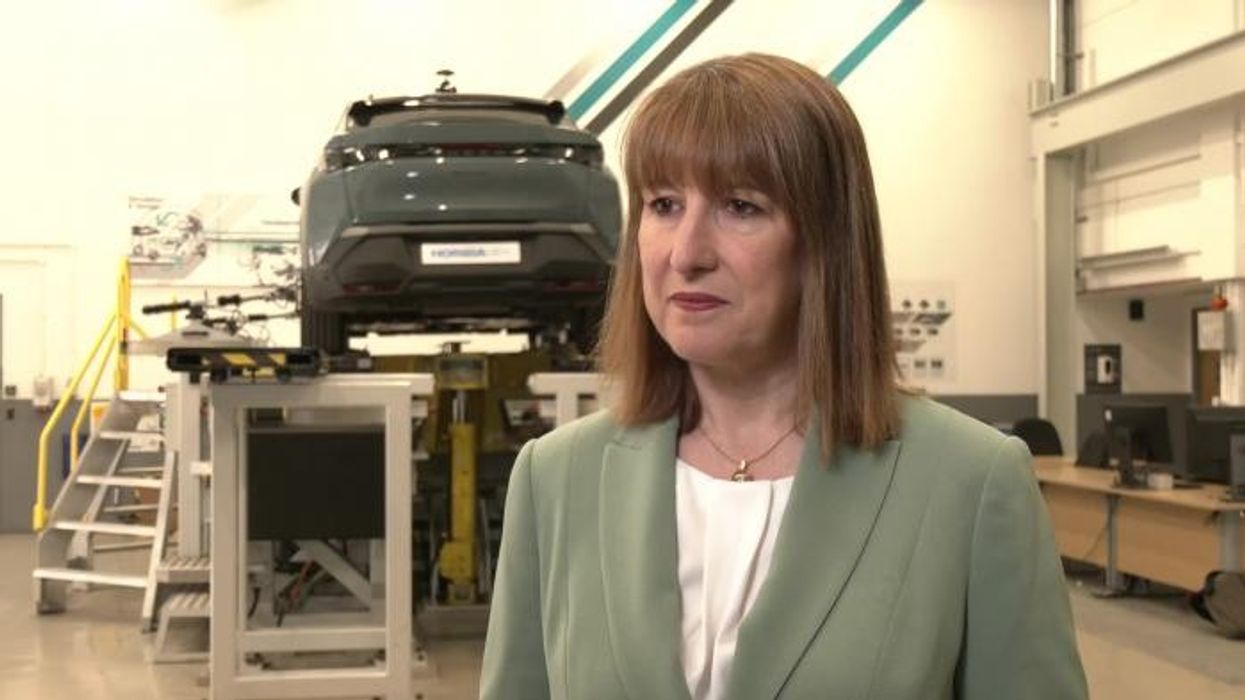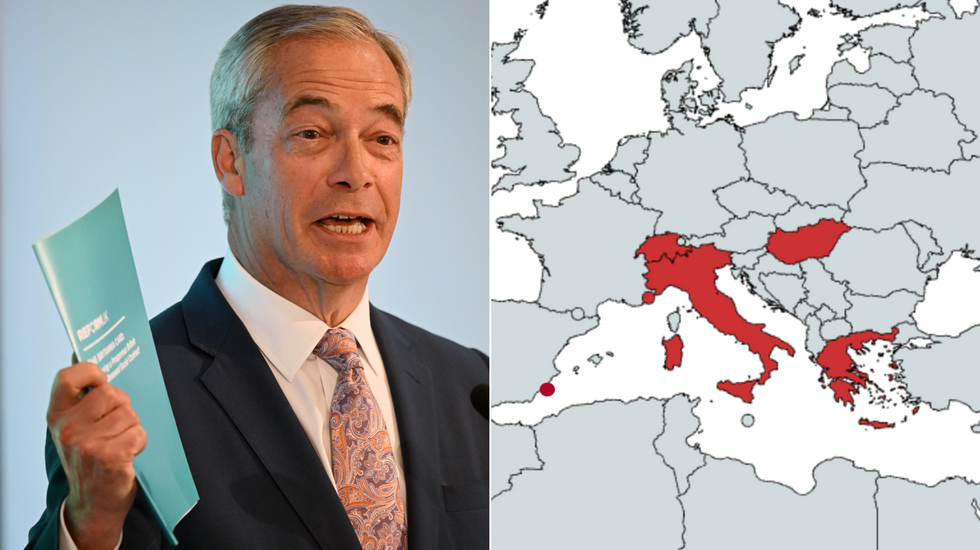MAPPED: The six flat tax hotspots that inspired Nigel Farage's 'Robin Hood' non-dom plan - will YOU benefit?

GB

Nigel Farage vows to rewrite non-dom tax rules in a radical bid to lure back wealth creators if Reform UK comes to power
Don't Miss
Most Read
Latest
Nigel Farage is proposing a flat-fee tax scheme for wealthy foreigners, offering indefinite tax breaks in exchange for a one-off "Robin Hood"-style payment.
The Reform UK leader says the plan, inspired by Italy’s flat tax regime, would grant affluent non-doms a "Britannia Card" exempting them from paying UK tax on offshore income and gains.
The flat fee would be redistributed to the lowest-paid, though the wealthiest would benefit most from the long-term savings.
Under the proposal, new non-doms would pay a one-off £250,000 "landing fee" in return for a so-called Britannia Card.
The scheme would allow them to be taxed on a remittance basis, meaning only UK income is taxed, while foreign income, capital gains and global wealth remain untouched. Inheritance tax would also not apply.
Britannia Card holders would receive a 10-year renewable multi-entry residence permit, encouraging long-term stays.
Reform UK claims that 100 per cent of the entry fee would be redistributed to the UK’s lowest-paid full-time workers.
But the flat‑tax idea isn't new. Countries like Italy and Switzerland have already tried to attract wealthy expats with similar schemes, offering generous tax incentives to high‑net‑worth individuals in exchange for a fixed annual or one‑off payment.
GB News takes a closer look at six global low-tax hotspots that have inspired Reform UK's controversial new plan to lure back wealthy foreigners.
Italy
Reform's proposed offer appears far more generous than Italy’s flat tax regime, introduced in 2017. Under the Italian model, wealthy foreigners can pay a fixed annual fee of €200,000 (£171,390) to shield foreign assets from domestic taxation, with the option to include additional family members for €25,000 (£21,423) each. The scheme is renewable for up to 15 years.
However, Tom Gauterin, the director who specialises in Trusts, Estates and Tax at Freeths, was unsure whether this Britania card "would actually raise any review as the £250,000 fee for a decade's worth of tax-privileged residence is cheap compared to similar levies in other countries, such as Italy.
Speaking to GB News, he added: "Given the number of huge changes to non-dom taxation over the last 17 years, would wealthy non-UK people actually trust this to be delivered? What happens if, as is entirely possible, Reform were to pass this legislation then lose the next election only five years into the ten-year residence period?
Switzerland
In Switzerland, non-doms don't pay a flat fee but are taxed based on annual living costs, including housing, food, and leisure, which must total at least CHF 434,700 (£396,844) to qualify.
Tax is then applied at regional rates, typically resulting in a bill between CHF 150,000 (£136,937) and CHF 350,000 (£319,520). In return, foreign income and assets are tax-exempt, and there’s no federal inheritance or gift tax.
Minimum tax thresholds can vary depending on whether the applicant is from the EU or not.
Farage’s proposals are more generous than Switzerland’s long-standing tax incentives for wealthy foreigners, which were among the first of their kind.
James Ward, head of Private Client at Kingsley Napley, said Reform UK’s plan is "deliberately more generous" than current and past regimes and could pressure the Chancellor to rethink her non-dom crackdown.
"It would certainly help to make the UK more competitive," he told GB News, adding that the 20-year inheritance tax shield would be "especially attractive" after Rachel Reeves’ "punitive" changes.
However, he warned the plan "curiously" excludes current non-doms, despite rising numbers of wealthy individuals leaving the UK — a trend he said must be reversed to avoid long-term damage.

The six flat tax hotspots that inspired Nigel Farage's 'Robin Hood' non-dom plan - will YOU benefit?
|Getty Images/Map Chart
Greece
Greece is among the countries likely to benefit from the UK's non-dom shake-up. Since 2019, it has offered wealthy foreigners a flat tax of €100,000 a year on overseas income for up to 15 years, with an extra €20,000 annually to include family members. To qualify, individuals must invest at least €500,000 in Greece within three years.
However, experts fear are not convinced that a Greek-style flat tax can be replicated in Britain.
Oliver Chapman, CEO of procurement firm OCI told GB News that "in theory, it’s clever policy engineering", noting the scheme could attract global wealth, boost VAT from high earners and counter Labour’s non-dom crackdown.
However, Chapman warned it could create a "£7billion annual revenue hole", nearly triple the one-off fee income.
"That’s a recurring, compounding cost," he said, adding that it may force cuts to public services or tax hikes elsewhere.
He also cautioned that the UK risks looking like "a tax haven for foreign billionaires", sparking public backlash and undermining global transparency efforts.
Gibraltar
Gibraltar, a British Overseas Territory bordering Spain, offers a favourable tax regime for individuals with assets over £2 million.
Under its "Category 2" rules, eligible residents are taxed only on the first £118,000 of their global income, capping their annual tax bill at around £45,000. To qualify, they must own or rent property within Gibraltar.
Monaco
Monaco offers a highly attractive tax residency, especially for the ultra-wealthy. Although not a full EU member, it participates in the Schengen Area, allowing easy travel across Europe. Personal income tax remains at 0 per cent , while corporate tax is set at 25 per cent.
To qualify, individuals must deposit at least €500,000 in a local bank and either buy or rent property in Monaco. Residency also requires a genuine commitment to living there - applicants must spend at least 183 days per year in the country for nine years to gain long-term residence rights.
Its exclusivity and location near France make it more appealing than many isolated low-tax jurisdictions.
Hungary
Hungary offers some of Europe’s most competitive tax rates, with a flat 15 per cent personal income tax and a nine per cent corporate tax. Dividends, capital gains, and interest are also taxed at 15 per cent, with social contributions capped at around €2,000 annually.
To become a tax resident, individuals must either live in Hungary for at least 183 days a year, have a permanent home there, or consider it their main centre of interest. While the tax system is attractive, Hungary is less immigration-friendly than some other EU countries.
However, the 2024 launch of the Guest Investor Visa provides a 10-year residency through one of three routes:
- A €250,000 investment in a government-approved fund (held for 5 years)
- A €500,000 purchase of residential real estate
- A €1 million non-refundable donation to scientific or artistic institutions.
As global competition for high-net-worth individuals intensifies, countries like Hungary, Monaco, and Switzerland are offering low-tax regimes and golden visa programmes to attract mobile capital.
These schemes promise economic stimulus in exchange for long-term residence and upfront investments, and they appear to be working, notes Harry Fenner, former CEO of Navana Property Group and a multi-millionaire entrepreneur.
He is broadly in favour of adopting a similar strategy for the UK.
He argues that Reform UK’s Britannia Card policy could revive Britain’s sluggish economy.
He said: "As CEO of Navana Property Group, I’ve seen first-hand how international investment can revitalise entire neighbourhoods, fund infrastructure, and drive sustainable growth."
Fenner defended the proposed Britannia Card as a serious economic strategy rather than a "passport-for-sale" scheme.
He said it could offer a stable, rules-based entry point for global investors and generate £1 billion annually if just 4,000 applicants are approved.
Fenner stressed that similar models work in places like the UAE and that the UK must compete for global wealth post-Brexit.
However, he warned that strong safeguards are needed to prevent abuse and public backlash, arguing the policy must support broader social goals and avoid favouring the rich at the expense of struggling taxpayers.










